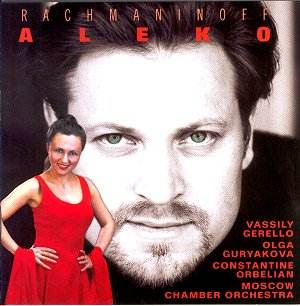Sergei RACHMANINOV (1873-1943)
Aleko.
 Vassily Gerello (baritone)
Aleko; Olga Guryakova (soprano) Zemfira; Vsevolod Grivnov (tenor) The Young
Gypsy; Mikhail Kit (bass) The Old Gypsy; Yurlov Capella; Moscow Chamber
Orchestra/Constantine Orbelian. Includes Pushkin's Poem, 'The Gypsies' read
in English by Michael York and in Russian by Vassily Lanovoy.
Vassily Gerello (baritone)
Aleko; Olga Guryakova (soprano) Zemfira; Vsevolod Grivnov (tenor) The Young
Gypsy; Mikhail Kit (bass) The Old Gypsy; Yurlov Capella; Moscow Chamber
Orchestra/Constantine Orbelian. Includes Pushkin's Poem, 'The Gypsies' read
in English by Michael York and in Russian by Vassily Lanovoy.
 Delos DE3269 [two discs]
[127'46]
Delos DE3269 [two discs]
[127'46]
Crotchet
Amazon
UK
Amazon
US

Aleko is possibly the finest of Rachmaninov's operas. Astonishingly,
it was composed in response to a graduation exercise set by Arensky at the
Moscow Conservatoire and dates from 1892. Written after a poem by Pushkin,
Aleko is an effective number opera, fitting neatly onto one CD with
a running time of about an hour.
For anyone who has yet to hear this piece, it may come as something of a
revelation. Rachmaninov's Russian roots are at their clearest (the Borodin
of the Polovtsian Dances hovers over the opening chorus). The orchestra
is given many chances to shine, from the seductively phrased Women's
Dance to the superb high violin articulation of the Men's Dance,
and the proto-emotionalism of the Intermezzo. The Moscow Chamber Orchestra
plays with full conviction throughout.
The baritone Vassily Gerello is an intensely musical Aleko, providing a
beautifully sung Cavatina. The preceding Scene by the Cradle
(with Olga Guryakova as Zemfira) is positively heart-melting. Mikhail
Kit as the Old Gypsy provides a fitting sense of longing in his narrative.
The chorus's contributions are uniformly excellent.
Järvi's performance on DG is only available as part of a three disc
set (coupled with Rachmaninov's other two operas, The Miserly Knight
and Francesca da Rimini). It boasts a starrier cast (Leiferkus in
the title role, with Maria Gulegina as Zemfira and Anne Sofie von Otter as
the Old Gypsy: DG 453 452-2), but Orbelian's authentically Russian forces
provide a fully complementary version.
The second disc consists of two readings of Pushkin's poem, The Gypsies,
read in English by Michael York and in Russian by Vassily Lanovoy. Non-Russian
speakers like myself will therefore only find half of the disc useful, and
then only for one or two playings. The performance of Aleko, however,
remains eminently recommendable.
Reviewer
Colin Clarke

